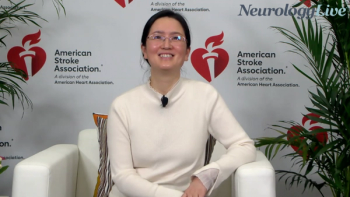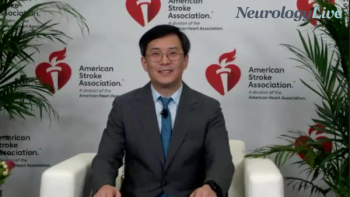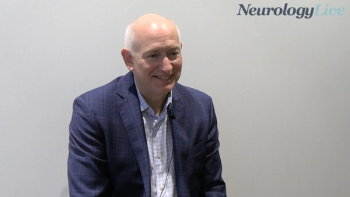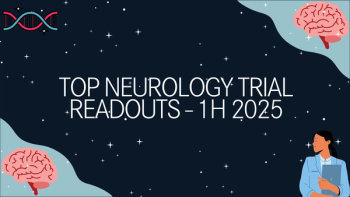
Cerebrospinal fluid lipid profiling revealed potential biomarkers for distinguishing NMOSD from MS and tracking disease activity, offering new insights into neuroinflammatory disease monitoring.

Isabella Ciccone, Content Associate, NeurologyLive®, has been with the team since September 2022. Follow her on X @iciccone7 or email her at [email protected]

Cerebrospinal fluid lipid profiling revealed potential biomarkers for distinguishing NMOSD from MS and tracking disease activity, offering new insights into neuroinflammatory disease monitoring.

The director of Integrative Neurosciences at Allegheny Health Network talked about integrative neurology, personalized medicine, and emerging diagnostic tools that enhance patient-centered care. [WATCH TIME: 5 minutes]

A recent study reported significantly elevated cerebrospinal fluid inflammatory markers in pediatric myelin oligodendrocyte glycoprotein antibody-associated disease during acute phases.

The chair of neurosurgery at the University of Arizona talked about the newly approved infusion therapy that offers continuous medication delivery to improve both motor and non-motor symptoms in Parkinson disease. [WATCH TIME: 5 minutes]

The clinical researcher at St. Jude Children's Research Hospital discussed the evolving treatment landscape for Charcot-Marie-Tooth disease, which will be featured in a session at the 2025 MDA Conference. [WATCH TIME: 7 minutes]

A 5-year retrospective analysis offered insights into disease characteristics, treatment responses, and clinical outcomes of neuromyelitis optica spectrum disorder as well as myelin oligodendrocyte glycoprotein antibody-associated disease.

The president and CEO at Project Sleep highlighted the need for clinicians to facilitate awareness of patient advocacy resources for those living with narcolepsy or idiopathic hypersomnia. [WATCH TIME: 5 minutes]

In a recent case report, a 46-year-old man living with chronic inflammatory demyelinating polyneuropathy experienced multiple relapses despite various conventional treatments; however, found promise in ofatumumab, an approved drug for multiple sclerosis.

The director of the Cerebrovascular Center at Mount Sinai talked about findings from recent trials presented at ISC 2025 investigating thrombectomy for distal vessel occlusions. [WATCH TIME: 4 minutes]

Julie Pilitsis, MD, PhD, MBA, chair of neurosurgery at The University of Arizona Tucson, discussed the impact of a newly approved continuous infusion therapy for Parkinson disease.

The professor at the Second Affiliated Hospital of Zhejiang University’s School of Medicine discussed findings from a trial suggesting that intravenous thrombolysis could benefit patients with ischemic stroke up to 24 hours after symptom onset. [WATCH TIME: 8 minutes]

The director of the neurological disease center at Beijing Anzhen Hospital talked about assessing the potential benefits and safety of intra-arterial tenecteplase in highly selected poststroke patients. [WATCH TIME: 6 minutes]

The movement disorders nurse practitioner at The Ohio State University Wexner Medical Center talked about a meeting that equips nurse practitioners and physician assistants to improve movement disorder patient care. [WATCH TIME: 5 minutes]

Jonathan Rubin, MD, MBA, chief medical officer at Supernus Pharmaceuticals, talked about the recent approval of the company’s subcutaneous infusion therapy SPN-830 for Parkinson disease.

In a recently presented study at ISC 2025, poststroke patients reported no additional benefit from using transcranial direct current stimulation as a potential intervention for recovery.

The president and CEO at Project Sleep talked about the foundational role of social connections and peer support in improving quality of life for individuals with narcolepsy. [WATCH TIME: 5 minutes]

The professor of neurology at the Geisel School of Medicine at Dartmouth shared his reaction to the recent FDA approval of AXS-07, a combination of meloxicam and rizatriptan, as a new therapy for acute migraine management. [WATCH TIME: 4 minutes]

Catch up on any of the neurology news headlines you may have missed over the course of January 2025, compiled all into one place by the NeurologyLive® team.

Julie Flygare, JD, president and CEO at Project Sleep, discussed the critical role of social connections and peer support in helping individuals with sleep disorders navigate their diagnosis.

The director of the Montefiore Headache Center at Albert Einstein College of Medicine discussed the recent FDA approval of a new migraine treatment that combines rizatriptan and meloxicam. [WATCH TIME: 5 minutes]

SPN-830 is a wearable subcutaneous infusion device designed to deliver continuous treatment throughout the waking day, ensuring more consistent control of OFF time.

A large registry-based study analyzed treatment patterns and attack risks in neuromyelitis optica spectrum disorder and myelin oligodendrocyte glycoprotein antibody-associated disease.

The chair of psychiatry at Tufts University School of Medicine discussed ongoing research exploring the potential of cannabinoids in treating agitation in Alzheimer disease. [WATCH TIME: 5 minutes]

A unique case highlighted the complex interplay between NMOSD and other autoimmune diseases, demonstrating the challenges in diagnosing and managing the condition.

Suzetrigine, a selective inhibitor of the NaV1.8 sodium channel, offers an alternative opioid treatment option for patients to treat moderate to severe pain without risk of addiction.

Recent results from a phase 2 trial of ATH434 revealed its potential in reducing brain iron accumulation and preserving motor function in early-stage multiple system atrophy.

Findings from previous phase 3 trial showed that treatment with AXS-07 resulted in significant reductions in headache pain freedom, migraine symptoms, and rescue medication use.

A new study identified key clinical and ultrasound markers that improved the differentiation between 2 conditions with overlapping features.

The chief of neuroinfectious diseases and global neurology at Northwestern Medicine talked about a relatively new autoimmune condition, marked by mitochondrial dysfunction. [WATCH TIME: 2 minutes]

Explore some of the most highly anticipated clinical trials with data readouts expected in the second half of 2025—key updates that researchers and clinicians in neurology won’t want to miss.